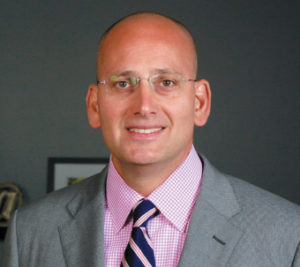Founder and Owner, McClellan Plastic Surgery

By Katlin Swisher
Tom McClellan, M.D., is committed to innovation in medicine.
After graduating from West Virginia University’s (WVU) School of Medicine, McClellan completed a plastic surgery residency at Lahey Hospital & Medical Center in Boston, which is an affiliate of both Tufts University and Harvard Medical School. He went on to Duke University for a hand and microsurgery fellowship, where he participated in cutting-edge brachial plexus and tendon research and then completed the renowned Paces aesthetic fellowship at Emory University in Atlanta, GA.
“I chose plastic surgery because it was such a fascinating and creative field—it’s the ultimate 3D puzzle. You have to use your ingenuity, knowledge and skills to make something whole again, and it’s just so fun and rewarding,” says McClellan.
“The other rewarding aspect about plastic surgery is that you get to restore the form and function of something that is missing or deformed, such as a nose, eyelid or breast.”
In 2008, McClellan moved to Morgantown, WV, to start his solo practice, McClellan Plastic Surgery, where he performs plastic, reconstructive and hand surgery. He also practices full time at Mon General Hospital and serves as the current president of the West Virginia Society of Plastic Surgeons
Throughout his career, McClellan has developed several innovative techniques and devices to improve both plastic surgery and patient care.
“Innovation within the field of plastic surgery has been one of the most fulfilling and rewarding aspects of my career,” he says. “I enjoy the entire process of dreaming, developing, patenting and building new devices and techniques to improve health care delivery.”
The product he is most proud of is AlloX2, an FDA-cleared tissue expander used for breast reconstruction after breast cancer. It was developed and first implanted at Mon General in Morgantown.
“It’s a significant improvement to help protect women and prevent complications during the reconstructive process,” he says. “AlloX2 is a big jump in our capabilities as surgeons to improve breast reconstruction and help prevent some of the complications associated with implant-based reconstruction, which is the most common way in which a woman undergoes breast reconstruction after breast cancer.”
AlloX2 has been widely adopted by surgeons across the U.S. and is used in thousands of women per year to improve their reconstructive process.
McClellan also created Figure 8, a reconstructive device used after open heart surgery. This closure device creates a stronger repair of the chest bone after heart surgery and allows patients to leave the hospital sooner with less pain following the procedure. Like the AlloX2, it was developed, tested and first implanted at Mon General in Morgantown.
“I love medicine. I love thinking about surgery and ways to improve patient outcomes. I love helping patients, and I have a natural curiosity and desire to educate people,” says McClellan. “I probably should have gone into academic medicine, but I wanted to actively pursue business and innovation outside of the constraints of academic institutions.”
That motivation led McClellan to become a bioentrepreneur, founding multiple medical device start-up companies, including Morgantown-based Intermed Partners, a new engineering lab where bioentrepreneurs develop ideas, perform research and build prototypes focused on health care. The lab brings WVU medical students together with engineers and designers to perform fundamental research and product development.
“We are working on a multitude of novel ideas to improve the human condition. These include devices to improve scars after surgery and reduce complications after rib fractures, as well as a new 3D-printed finger for amputees that can be downloaded from the internet,” he says. “The students have presented our original research and devices at multiple national meetings alongside researchers from Harvard and Stanford. Honestly, it’s incredible to see the steps we are making to spin out a few of these devices into new companies potentially run by the students. My hope is that I’m helping plant the seed of innovation in them that will grow and then they will have the skills needed to develop their own great ideas into products and companies.”
McClellan also co-founded the Huntington-based biotech skin care company Serucell Corporation, where he serves as chief medical officer.
“Future companies like these in West Virginia could really improve the job base here in the state with high-paying tech jobs, which is more of what we need,” he says. “Innovative ideas that become new companies and provide great jobs must be the future of our state.”
Serucell Corporation
Serucell Corporation is a bio-cellular skin care company located in Huntington, WV. There, cells are grown, and byproducts of those cells are harvested and placed into skin care products that help improve firmness, hydration, discoloration and many other skin-related challenges. These products, which are sold nationwide by Neiman Marcus and can be found at The Greenbrier Resort, are used by many Hollywood stars.
Serucell’s products are created on the basis that cells communicate with each other, but factors like sun damage, environmental stress and natural aging can interrupt that communication, keeping skin from looking its best. Serucell’s patented KFS Cellular Protein Complex is the world’s only dual cell technology skin care solution.
KFS stands for keratinocyte and fibroblast serum. Launched in 2018, KFS is the first and only microserum of its kind, and it focuses on providing deep rejuvenation to the epidermal and dermal layers. A recent clinical study demonstrated a significant improvement in skin quality and appearance after only three weeks of daily use.



